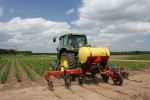Researchers at Michigan State University's Kellogg Biological Station (KBS) Long-term Ecological Research (LTER) program have helped develop a way for farmers to reduce crop-related emissions of a greenhouse gas while potentially lowering fertilizer costs, maintaining crop yields, and getting paid to do so.
KBS scientists have developed a program to reduce farm-related emissions of nitrous oxide (N2O), a potent greenhouse gas that also destroys ozone in the stratosphere. Using data collected from Michigan farms, they developed a program whereby farmers can generate carbon credits for reducing N2O emissions from their fields.
This "proof of concept" project allows farmers to sell these carbon credits and recoup the costs of more careful fertilizer use, said Phil Robertson, MSU professor of plant, soil and microbial sciences and director of the KBS program.
This June a Michigan farmer was issued the first carbon credits for reduced fertilizer use from the American Carbon Registry, a national carbon standard organization.
Robertson said that N2O is the third most important greenhouse gas after carbon dioxide and methane and that nitrogen fertilizers represent one of the largest sources of greenhouse gases from agricultural production.
Atmospheric carbon dioxide, methane, N2O and other greenhouse gases all act as a blanket, he said, keeping the earth's surface warm, which is vital to our survival on earth. When the blanket gets too "thick," however, temperatures begin to rise above desirable ranges.
“Crops are not particularly efficient at taking up nitrogen, and when more fertilizer is applied than the plants need, the excess is converted to N2O by soil microbes,” he said.
The KBS project, funded by the Electric Power Research Institute, was designed to determine the proper balance between fertilizer use and reduced N2O emissions while protecting crop yields.
So far only one Michigan farm has participated in the project, although the next phase plans to add many more, said Neville Millar, a KBS senior research associate who has helped lead the project for the last six years. "We will focus on corn," Millar said, "but other crops respond similarly and can be eligible too."
Robertson said that farmers already manage fertilizer but are often reluctant to further reduce fertilizer use because they fear hurting yields. "Our research shows fertilizer use can be reduced to get N2O emission reductions while maintaining crop yields," he said.
"One of the ways that farmers can reduce N2O emissions is by more precisely measuring fertilizer use. There are mathematical models that help calculate crop nitrogen needs -- based on types of soil, water, temperature and other factors -- allowing farmers to add no more fertilizer than necessary.”
"That generally is less than what they use now."
Millar said that nitrogen fertilizers have been relatively inexpensive in the past and it has been easy to apply more as insurance against lower crop yields. Now, however, the cost of fertilizer is higher and this means that farmers are more cautious about using more than necessary, he said. Carbon credits are intended to further encourage farmers to reduce their rate.
Another element in the project focused on the so-called cap and trade program that sets a cap on the amount of greenhouse gases a company can emit. Companies are issued credits, which allow them to emit greenhouse gases as long as they don't exceed the cap. Voluntary carbon markets are well established in the U.S., with California establishing the first mandatory program last year.
If a company is unable to meet its emissions cap, it can buy offsets from other sectors, such as forestry and agriculture, which are expected to remain exempt from caps. This could be a real opportunity for farmers.
In the KBS project, the Michigan farmer generated credits by reducing N2O emissions. These credits will be sold to The Climate Trust, an Oregon-based non-profit organization that works to reduce greenhouse gases.
The Climate Trust "retires" the credits, Robertson said, as a way to ensure that overall emissions are lowered.
"This is a method to help us move to a more carbon neutral future," Robertson said. "Farmers have a lot of tools at their disposal to reduce future fertilizer needs, but these tools cost money. The carbon credit program is one way to compensate them for taking the trouble to use fertilizer more precisely."

 Enlarge this image
Enlarge this image